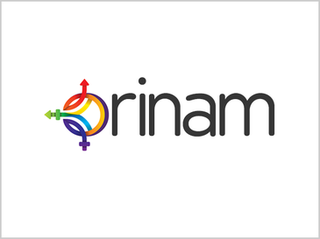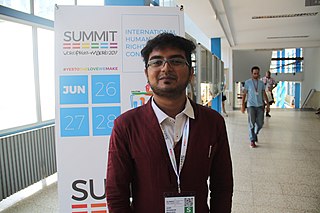Related Research Articles
Homosexuality in India is legally permitted and tolerated by the most of the traditional native philosophies of the nation, and legal rights continue to be advanced in mainstream politics and regional politics. Homosexual cohabitation is also legally permitted and comes with some legal protections and rights.

Lesbian, gay, bisexual, and transgender (LGBT) people in Azerbaijan face significant challenges not experienced by non-LGBT residents. Same-sex sexual activity has been legal in Azerbaijan since 1 September 2000. Nonetheless, discrimination on the basis of sexual orientation and gender identity are not banned in the country and same-sex marriage is not recognized.

Lesbian, gay, bisexual, and transgender (LGBT) rights in India have expanded in the 21st century, though much of India's advancements on LGBT rights have come from the judiciary and not the legislature. Indian LGBT citizens still face social and legal difficulties not experienced by non-LGBT people.

Lesbian, gay, bisexual, and transgender (LGBT) rights in Nepal have expanded in the 21st century, though much of Nepal's advancements on LGBT rights have come from the judiciary and not the legislature. Same-sex sexual activity was decriminalized in 2007. On 28 June 2023, a single judge bench of Justice Til Prasad Shrestha issued a historic interim order directing the government to make necessary arrangements to "temporarily register" the marriages of "non-traditional couples and sexual minorities". The full bench of the Supreme Court has yet to deliver a final verdict. The first "same-sex" marriage of a trans woman and a cisgender man occurred in November 2023. Nepal will be the first least developed country to legalize same-sex marriage, and the second jurisdiction in Asia after Taiwan.

Lesbian, gay, bisexual and transgender (LGBT) rights in Tamil Nadu are the most progressive among all states of India. Tamil Nadu was the first state in India to introduce a transgender welfare policy, wherein transgender individuals can access free gender affirmation surgery in government hospitals and various other benefits and rights. The state was also the first to ban forced sex-selective surgeries on intersex infants, and also the first state to include an amendment in its state police guidelines that expects officers to abstain from harassing the LGBTQIA+ community and its members. The state also became the first to ban conversion therapy as well as the first to introduce LGBTQIA+ issues in school curricula.
Various topics in medicine relate particularly to the health of lesbian, gay, bisexual, transgender, queer, intersex and asexual (LGBTQIA) individuals as well as other sexual and gender minorities. According to the US National LGBTQIA+ Health Education Center, these areas include sexual and reproductive health, mental health, substance use disorders, HIV/AIDS, HIV-related cancers, intimate partner violence, issues surrounding marriage and family recognition, breast and cervical cancer, inequities in healthcare and access to care. In medicine, various nomenclature, including variants of the acronym LGBTQIA+, are used as an umbrella term to refer to individuals who are non-heterosexual, non-heteroromantic, or non-cis gendered. Specific groups within this community have their own distinct health concerns, however are often grouped together in research and discussions. This is primarily because these sexual and gender minorities groups share the effects of stigmatization based on their gender identity or expression, and/or sexual orientation or affection orientation. Furthermore, there are subpopulations among LGBTQIA+ groups based on factors such as race, ethnicity, socioeconomic status, geographic location, and age, all of which can impact healthcare outcomes.

India's LGBTQ culture has recently progressed in its cities due to the growing acceptance of the LGBTQ community in urban India in the 21st century.
Chennai has LGBTQIA cultures that are diverse concerning- socio-economic class, gender, and degree of visibility and politicisation. They have historically existed in the margins and surfaced primarily in contexts such as transgender activism and HIV prevention initiatives for men having sex with men (MSM) and trans women (TG).

Orinam is a non-funded, social, and activist collective that works to enhance understanding of alternate sexualities and gender identities among families, communities and society. It was founded in 2003 in Chennai under the name MovenPick and is one of the oldest collective of its kind in India. People affiliated with Orinam are from or trace their ancestry to the following geo-cultural: People of Tamil Origin from Tamil Nadu, India. Orinam provides a platform for creative expression, personal and social commentary by Queer people of Tamil Origin and of Indian Origin primarily. Orinam also acts as a local support group in Chennai for the queer community. Orinam also partners with the city-, state- and national initiatives around decriminalisation of homosexuality by amending Section 377 of the Indian Penal Code and LGBTQ rights.

Lesbian, gay, bisexual and transgender (LGBT) people in Kerala face legal and social difficulties not experienced by non-LGBT persons. However, Kerala has been at the forefront of LGBT issues in India after Tamil Nadu. It became one of the first states in India to establish a welfare policy for the transgender community and in 2016, proposed implementing free gender affirmation surgery through government hospitals. Same-sex sexual activity has been legal since 2018, following the Supreme Court ruling in Navtej Singh Johar v. Union of India. In addition, numerous LGBT-related events have been held across Kerala, including in Kochi and Thiruvananthapuram. However, there is also increasing opposition to LGBT rights recently as evidenced by the anti-LGBT campaigns spearheaded by meninist groups and Muslim organisations like Indian Union Muslim League, Samastha and Jamaat-e-Islami.

Gopi Shankar Madurai is an Indian equal rights and Indigenous rights activist. Shankar was one of the youngest, and the first openly intersex and genderqueer statutory authority and one of the candidates to contest in 2016 Tamil Nadu Legislative Assembly election. Shankar is also the founder of Srishti Madurai Student Volunteer Collective. Shankar's work inspired the Madras High Court to direct the Government of Tamil Nadu to order a ban on forced sex-selective surgeries on intersex infants. In December 2017, Shankar was elected to the executive board of ILGA Asia. In August 2020, the Ministry of Social Justice and Empowerment appointed Shankar as the South Regional representative in the National Council for Transgender Persons.
The following list is a partially completed compilation of events considered to have a profound effect on the welfare or image of Tamil sexual minorities. The use of bold typeface indicates that the event is widely considered to be landmark:
This is a list of notable events in the history of LGBT rights that took place in the year 2021.

S Sushma &Anr. versus Commissioner of Police&Ors.(2021) is a landmark decision of the Madras High Court that prohibited practice of "conversion therapy" by medical professionals in India. The court directed comprehensive measures to sensitize the society and various branches of the Union and State governments to remove prejudices against the queer community.

Sultana Mirza &Anr. v. State Of Uttar Pradesh &Ors. (2020), a decision of the Allahabad High Court, established that the Constitutional Court bears the responsibility of overseeing and upholding both constitutional morality and the rights of citizens, particularly when these rights are endangered solely due to their sexual orientation.

Arun Kumar &Anr. versus Inspector General of Registration&Ors. (2019) is a decision of the Madras High Court which recognised trans woman as a "bride" within the meaning of the Hindu Marriage Act 1955 and prohibited genital-normalizing surgery for intersex infants and children except on life-threatening situations.

Adhila Nasarin versus State Commissioner of Police &Ors.(2022) is case where Kerala High Court held that the adults in mutually consenting relationship should be allowed to live their lives according to their informed choice, regardless of gender.

Ujjawal &Anr. versus State of Haryana&Ors.(2021), a case where Punjab and Haryana High Court, refused to provide police protection to a couple facing threat to their lives and personal liberty, citing potential disruption to "social fabric of the society."

Devu G. Nair versus State Of Kerala &Ors. (2023) is an ongoing Supreme Court case, poised to examine the legality of Conversion Therapy and addressing whether the High Court should have facilitated the alleged detainee's opportunity to provide their statement in person within the secure confines of the High Court building.

Trinetra Haldar Gummaraju is an Indian actress, medical doctor, content creator, and transgender activist known for her works in Television, and Hindi cinema. She began her career as a primary care physician and made her acting debut with Made in Heaven, an Indian web-series that premiered on Amazon Prime Video on 8 March 2019.
References
- 1 2 "Madras High Court | Profile of Judges". www.hcmadras.tn.nic.in. Retrieved 7 June 2021.
- ↑ Sureshkumar (1 June 2018). "Madras high court gets seven more judges | Chennai News - Times of India". The Times of India. Retrieved 7 June 2021.
- ↑ "9 additional judges at MHC made permanent". dtNext.in. 14 February 2020. Archived from the original on 28 September 2020. Retrieved 7 June 2021.
- 1 2 S Sushma v. Commissioner of Police , W.P.No. 7284 of 2021( Madras High Court ), Text .
- ↑ S, Mohamed Imranullah (29 April 2021). "Judge wants to learn about same sex relationships before penning judgment". The Hindu. ISSN 0971-751X . Retrieved 8 June 2021.
- ↑ Emmanuel, Meera. ""I am not fully 'woke' on this aspect:" Madras High Court Judge fixes appointment with psychologist to understand same-sex relationships better". Bar and Bench - Indian Legal news. Retrieved 8 June 2021.
- 1 2 Tripathi, Karan (7 June 2021). "Society Needs to Change, Not the LGBTQIA+ Couples: Madras HC". TheQuint. Retrieved 8 June 2021.
- ↑ Krishnan, Murali. "[Breaking] Madras High Court bans medical attempts to cure sexual orientation; suggests changes to school curricula to educate students on LGBTQ". Bar and Bench - Indian Legal news. Retrieved 8 June 2021.
- ↑ "Madras High Court bans medical attempts to "cure" sexual orientation, issues guidelines for LGBTQIA+ community safety". India Legal. 7 June 2021. Retrieved 8 June 2021.
- 1 2 "'Knee-Jerk Reaction': Madras HC Slams NCERT's Removal of Transgender-Inclusive Manual". The Wire. Retrieved 18 July 2023.
- 1 2 "Madras High Court 'dismayed' over taking down of transgender-inclusive manual from NCERT website". The New Indian Express. Retrieved 10 December 2021.
- ↑ James, Sebin (8 December 2021). "NCERT Withdrawing Transgender Children Report Due To "Pressure Tactics" Unfortunate : Madras High Court". www.livelaw.in. Retrieved 10 December 2021.